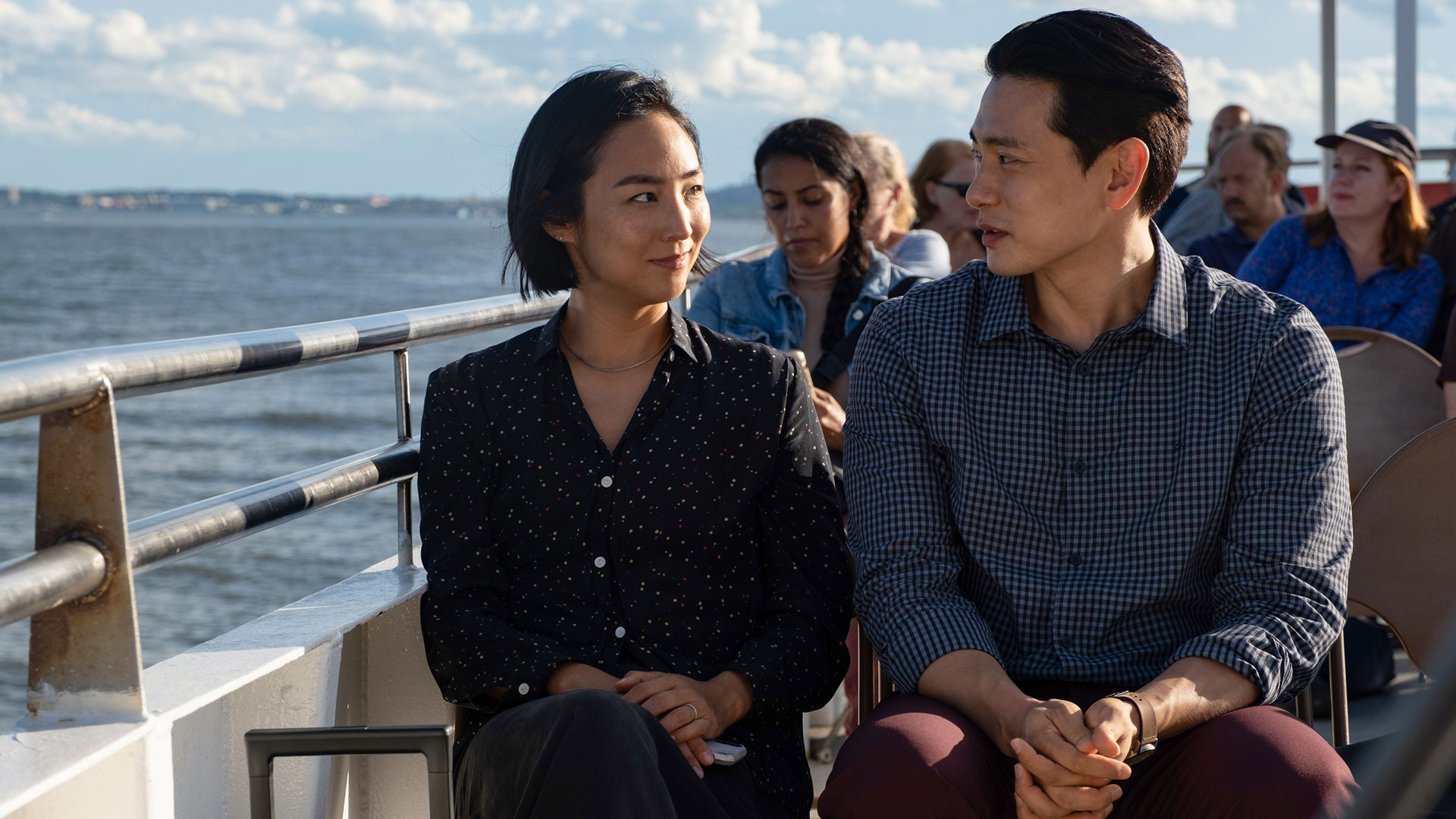Whether miniscule or major, the millions of decisions we make form the winding path of our lives. Specific reasons for taking certain forks in the road can often be lost to the sea of time, swelling back up only as our memory allows. A triptych not-quite-romance crossing nearly a quarter-century, playwright Celine Song’s directorial debut Past Lives examines such universal experience with keen cultural specificity, telling the story of childhood friends who twice reconnect later in life. It’s a warm, patient film culminating in a quietly powerful, reflective finale, though its sum is greater than its parts when the first two sections register a touch underdeveloped.
Inspired by Song’s personal experiences, it begins 24 years earlier in Seoul as Na Young (Seung Ah Moon) and Hae Sung (Seung Min Yim) are primary school classmates, forming a playful bond before the former’s family decides to move to Canada. Her dad is a director and mom an artist, hinting at the writerly path she’ll head down. With no contact for 12 years, we jump in time after Hae Sung (now played by Teo Yoo) finishes his mandatory military service and, per Korean tradition, moves back with his family as he begins engineering school. Na Young, now Nora (Greta Lee), has meanwhile embarked to NYC to launch her career as an author in the midst of an MFA program. They reconnect thanks to the halcyon days of Facebook; so begins a flirtatious, long-distance relationship where neither can make the trip to the other’s respective country. There’s a lovely rhythm to the patter of their digital chats, but this section lacks emotional heft, underwritten and simplified as if Song can’t wait to jump to the final, longest, and most rewarding section of her film. Spending more time browsing flights to Seoul than focusing on the reason she came to NYC in the first place, Nora decides to break off the relationship.
Another 12 years pass, Nora now deep into a marriage with fellow author Arthur (John Magaro), whom she met at a writing retreat around the time she broke off her contact with Hae Sung. The two enjoy a quiet, unadorned life in their East Village apartment. With Hae Sung planning a trip to New York, it presents an opportunity for the childhood sweethearts to reconnect physically for the first time in 24 years. As the weight of what could have been hangs over, a wistful and bittersweet reunion commences over the course of just a few days. In the first moments of their embrace, Song beautifully incorporates a brief flash of their early days together to reinforce the vast passage of time and how much the circumstances of our lives can change while we still carry the same yearning souls. Smartly eschewing the more obvious path of a rekindled romance, Hae Sung and Nora’s discussions sway from small talk to reminiscing about the different paths their lives took. Their interaction is fond yet distant: we witness two people, born in the same city, now shaped by entirely different circumstances in their most formative years. This dichotomy is wonderfully realized by Song in both their cultural differences and ways their long, furtive glances say more than words ever could, as if every stare makes up for years of being apart.
The third act carries as much heartbreak as humor, much of the latter having to do with Arthur’s third wheel-style participation in this reunion. Before he meets Hae Sung, he comments to Nora how grandiose this story of reconnection is compared to their marriage, and in a movie he’d be the evil white American person getting in the way of a long-lost romance. Song is, fortunately, more perceptive and understanding in conveying this tangled web of feelings. She fleshes out Arthur in his reserved but genuine interest in Hae Sung’s life, even if he may harbor a speck of resentment in the tighter cultural and childhood bond his wife shares. In some ways, Hae Sung, a disappointingly blank slate for Nora to project upon, seems less-formed than Arthur. Does Nora actually have a connection with Hae Sung, someone she now barely knows, or is he just representative of life she never got to experience, the symbolic ghost of a country left behind?
Song delicately juggles such questions of identity and longing in a stellar moment of reconciliation at the film’s conclusion, deep into the night as our leads consider if the lives they lead were meant to be. If its structural conceit has already bred comparisons between Song’s work and the Before trilogy, Linklater’s films are more concerned with a constant dream of dialogue; Past Lives nods more to the unspoken feelings of a Wong Kar-wai film. Small Axe cinematographer Shabier Kirchner also brings a balm of calmness to each composition, giving ample breathing room to our characters as this story of longing weaves its path.
While taking its title from the Korean belief of In Yun––wherein the connections people make in this life are actually the culmination of thousands of others from past lives––it’s joked this profound idea is often used as a seduction tactic for courting. That gentle sense of wit, mixing the philosophical and the personal, sums up the power of Past Lives. Rather than instilling anxiety in contemplating another path one could’ve taken, Song’s debut provides comfort by suggesting everyone’s journey is uniquely their own.
Past Lives premiered at Sundance 2023 and will be released by A24.

